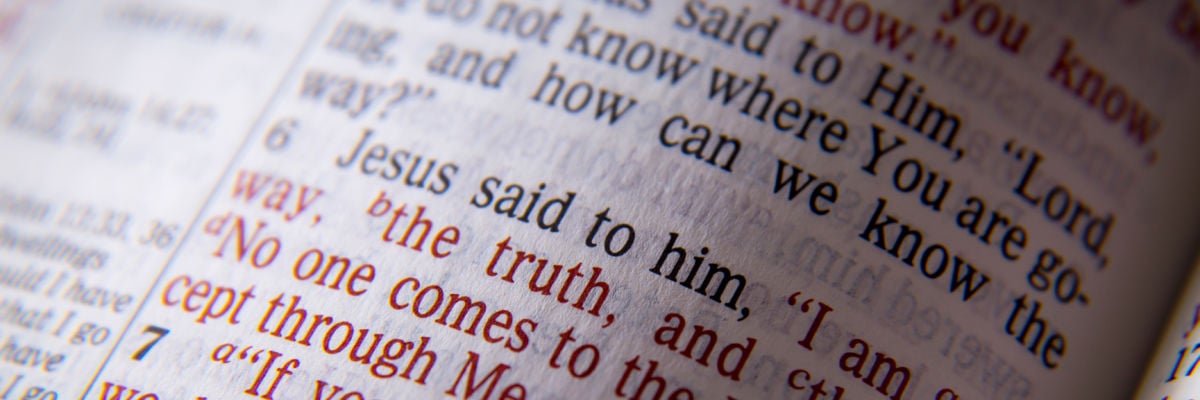
Episode 34: Year A – 15th Sunday of Ordinary Time
In this episode of the Sunday Catholic Word, we zero in on three details in the readings for this upcoming 15th Sunday of Ordinary Time, Year A. The first two come from the second reading, taken from Romans 8:18-23. The relevant apologetical topic that each relate to, though in different ways, is the problem of evil. The third detail is basically the whole of the Gospel reading, which is Jesus’ parable about the Sower and the seed in Matthew 13:1-9, 18-23. The relevant apologetical topic that I will draw out is the possibility that Christians can lose their salvation, which refutes the notion prevalent among some Christians that once we’re a Christian we are eternally secure in our salvation.
Looking for Sunday Catholic Word Merchandise? Look no further! https://shop.catholic.com/catholic-answers-merchandise/?q=sunday
Hey everyone,
Welcome to The Sunday Catholic Word, a podcast where we reflect on the upcoming Sunday Mass readings and pick out the details that are relevant for explaining and defending our Catholic faith.
I’m Karlo Broussard, staff apologist and speaker for Catholic Answers, and the host for this podcast.
In this episode, we’re going to zero in on three details in the readings for this upcoming 15th Sunday of Ordinary Time, Year A. The first two come from the second reading, taken from Romans 8:18-23. The relevant apologetical topic that each relate to, though in different ways, is the problem of evil. The third detail is basically the whole of the Gospel reading, which is Jesus’ parable about the sower and the seed in Matthew 13:1-9, 18-23. I will be skipping over verses 10-18. The relevant apologetical topic that I will draw out is the possibility that we Christians can lose our salvation, which refutes the notion prevalent among some Christians that once we’re a Christian we are eternally secure in our salvation.
Let’s start with the second reading, again, taken from Romans 8:18-23.
18 I consider that the sufferings of this present time are as nothing compared with the glory to be revealed for us. 19 For creation awaits with eager expectation the revelation of the children of God; 20 for creation was made subject to futility, not of its own accord but because of the one who subjected it, in hope 21 that creation itself would be set free from slavery to corruption and share in the glorious freedom of the children of God. 22 We know that all creation is groaning in labor pains even until now; 23 and not only that, but we ourselves, who have the firstfruits of the Spirit, we also groan within ourselves as we wait for adoption, the redemption of our bodies
There are two details here that are worth highlighting as they relate to the problem of evil. The first is Paul’s teaching in verse 18 that the sufferings of this life don’t compare with the glory to be revealed.
Often, when suffering is the topic of conversation, it’s posed as a logical challenge to our belief in an all-good and all-powerful God. Other times, however, suffering causes an emotional problem: when a person struggles with angry feelings toward God, and is repulsed at the idea that God would allow terrible things to happen to him. The person who struggles emotionally with evil is not interested in philosophical arguments; he just wants the pain to go away, or at least to find meaning and purpose in it. He wants help in getting through the darkness of suffering and despair.
For this kind of obstacle, we need to look beyond reason and logic for a successful strategy—we need to look to Christian revelation.
And here is where Paul’s teaching comes into play. Paul teaches that for those who believe in Jesus, all suffering will eventually end, and they will be compensated with great rewards in the eternal life of heaven for such suffering. Such rewards include receiving a glorified body back and experiencing an everlasting and supreme degree of happiness.
Knowing that there is an end to the suffering, and knowing that there is compensation for it, can provide those who suffering the courage to find meaning and purpose in it. It helps the one suffering know that his sufferings do not have to be ultimately tragic. If he believes in Jesus, and perseveres in that belief until death, then at the end of time he will receive recompense in his glorified body and experience a definitive and supreme state of happiness that is glorious enough to offset the tragedies of this life. Such a glimpse of light and hope can be sufficient to help people get the darkness of suffering.
The second detail that’s worth highlighting as it relates to the problem of evil is Paul’s teaching that creation will be set free from the slavery to corruption. The idea of corruption within creation often sparks conversations about whether it was God’s intention in the first place for things to die before the fall.
Some Christians believe that death and corruption came into the world only after the sin of Adam and Eve. This being the case, the modern scientific narrative that life on planet earth began roughly 3.5 billion years old ago and that living beings, such as plants and animals, came and went during that period would seem to conflict with the Bible. Although such a conflict might exist for some Christians, it doesn’t necessarily exist for Catholics.
Here’s what the Catechism of the Catholic Church teaches in paragraph 310:
But why did God not create a world so perfect that no evil could exist in it? With infinite power God could always create something better. But with infinite wisdom and goodness God freely willed to create a world “in a state of journeying” toward its ultimate perfection. In God’s plan this process of becoming involves the appearance of certain beings and the disappearance of others, the existence of the more perfect alongside the less perfect, both constructive and destructive forces of nature. With physical good there exists also physical evil as long as creation has not reached perfection.
Notice that the Catechism affirms that God created an imperfect world that involves things coming into and going out of existence. Presumably, this would include living things. Moreover, it explicit affirms the existence of physical evil. Now, this isn’t a statement about the world simply after the fall, since the world wasn’t “created” then. The Catechism speaks of such imperfections existing upon the creation of the world. Therefore, the Catechism affirms the existence of physical evil, or death, before the fall. The death that enters after the Fall is human death. As the Catechism states in paragraph 400, “[T]he consequence explicitly foretold for this disobedience [Adam’s disobedience] will come true: man will “return to the ground,” for out of it he was taken. Death makes its entrance into human history.”
“But,” one might counter, “if we affirm that God willed physical death for living things before the fall, then we wouldn’t be able to appeal to Adam’s sin as an explanation for the problem of physical evil in the world. And God would appear not to be all-good.”
It is true that a Christian wouldn’t be able to appeal to Adam’s sin as an explanation for the problem of physical evil. But I argue that he shouldn’t have been doing so in the first place.
But what about the claim that God wouldn’t be all-good if He willed death to be part and parcel of the world?
We don’t have time to give a full blown out answer to this question. Suffice to say that in order for physical evil to count against God’s goodness, there would have to be some lack of justice on God’s part for not preventing it, or for willing that it be part of the physical world. But God is not bound in justice to himself or to living creatures to preserve them from corruption and death. Why? Because corruption and death belong to the nature of corporeal beings—it’s part and parcel of material beings. For God to create material beings, whether inanimate or animate, and preserve them from such corruption and death would be for God to give them something over and above their nature. In other words, it would be a grace, or a miracle.
Now, here’s the key: God is not bound in justice to Himself or to material creatures to give such creatures something over and above their nature. All that He’s bound to give in justice is what’s relevant for their nature and those things that are ordered to fulfilling or perfecting such natures. For God to create things that will corrupt and die is for God simply to create things with a corporeal nature. And there is nothing unjust about that. This being the case, the presence of physical evil within an imperfect world in a state of journeying doesn’t count against God’s goodness.
Let’s now turn to the Gospel reading and the parable of the sower and the seed, recorded by Matthew in 13:1-9, 18-23. I’m not going to read the whole thing since we’re all familiar with the parable. Rather, I want to highlight the verses that are relevant for our purposes here: verses 20-21:
The seed sown on rocky ground
is the one who hears the word and receives it at once with joy.
But he has no root and lasts only for a time.
When some tribulation or persecution comes because of the word,
he immediately falls away.
The detail here that is worthy of highlight is the seed being received but the person falling away when persecution comes. The seed is the Word of God. And Jesus says there are some that receive it with joy, indicating that they receive it in a real way. As Jesus says, “it lasts for a time.” Although it doesn’t last forever, it lasts for a time. So, the seed—God’s Word—has been legitimately received.
Now, to receive the Word in this way is to be saved. Yet, Jesus says it only lasts “for a time,” and the one who legitimately received the Word falls away. Falls away from what? Falls away from salvation.
So, Jesus reveals to us something that is entirely antithetical to the once saved always saved doctrine, also known as eternal security: a person can become a Christian by receiving God’s Word and fall away from salvation.
Conclusion
Well, my friends, that does it for this episode of the Sunday Catholic Word. The readings for this upcoming 15th Sunday of Ordinary Time gives us opportunity to reflect on two major apologetical topics:
- The problem of physical evil, and
- The possibility of Christians losing the gift of salvation.
As always, I want to thank you for subscribing to the podcast. And please be sure to tell your friends about it and invite them to subscribe as well. Also, if you’re interested in getting some cool mugs and stickers with my logo, “Mr. Sunday podcast,” go to shop.catholic.com.
I hope you have a blessed 15th Sunday of Ordinary Time. God Bless!



